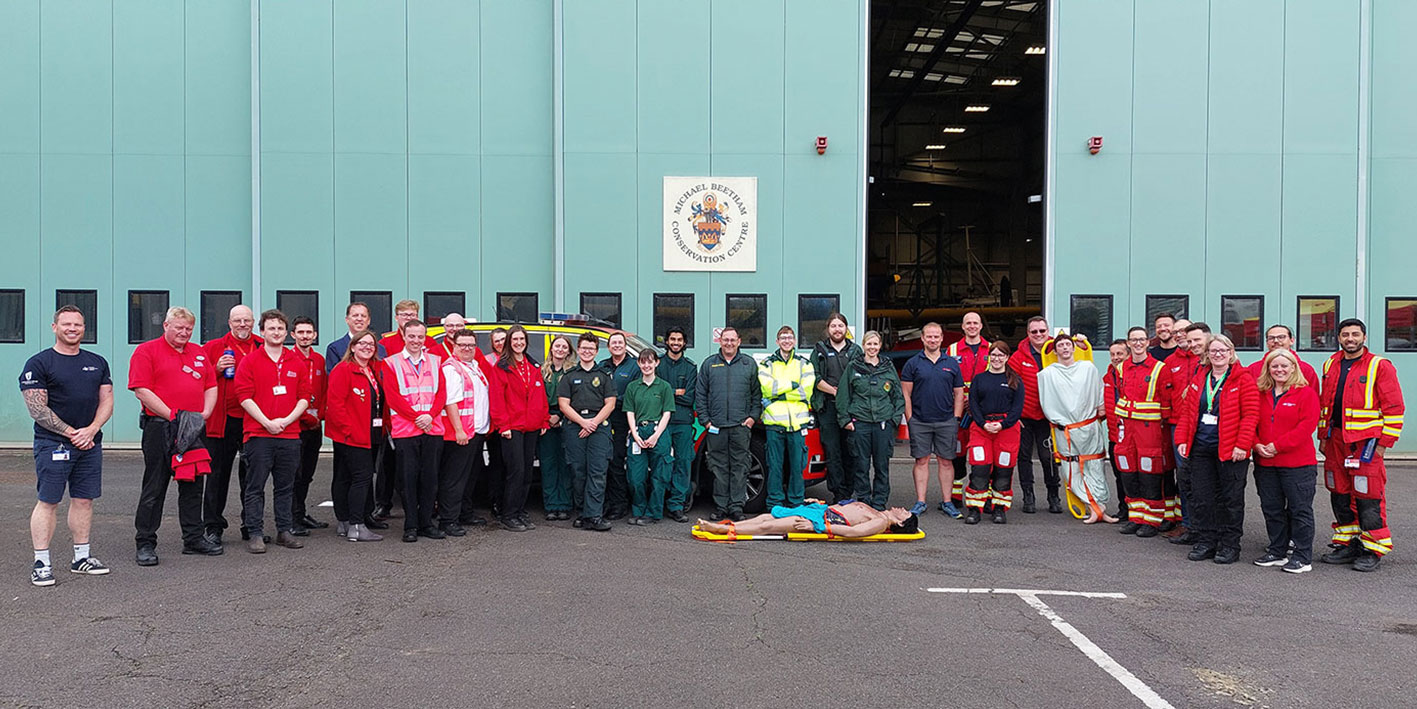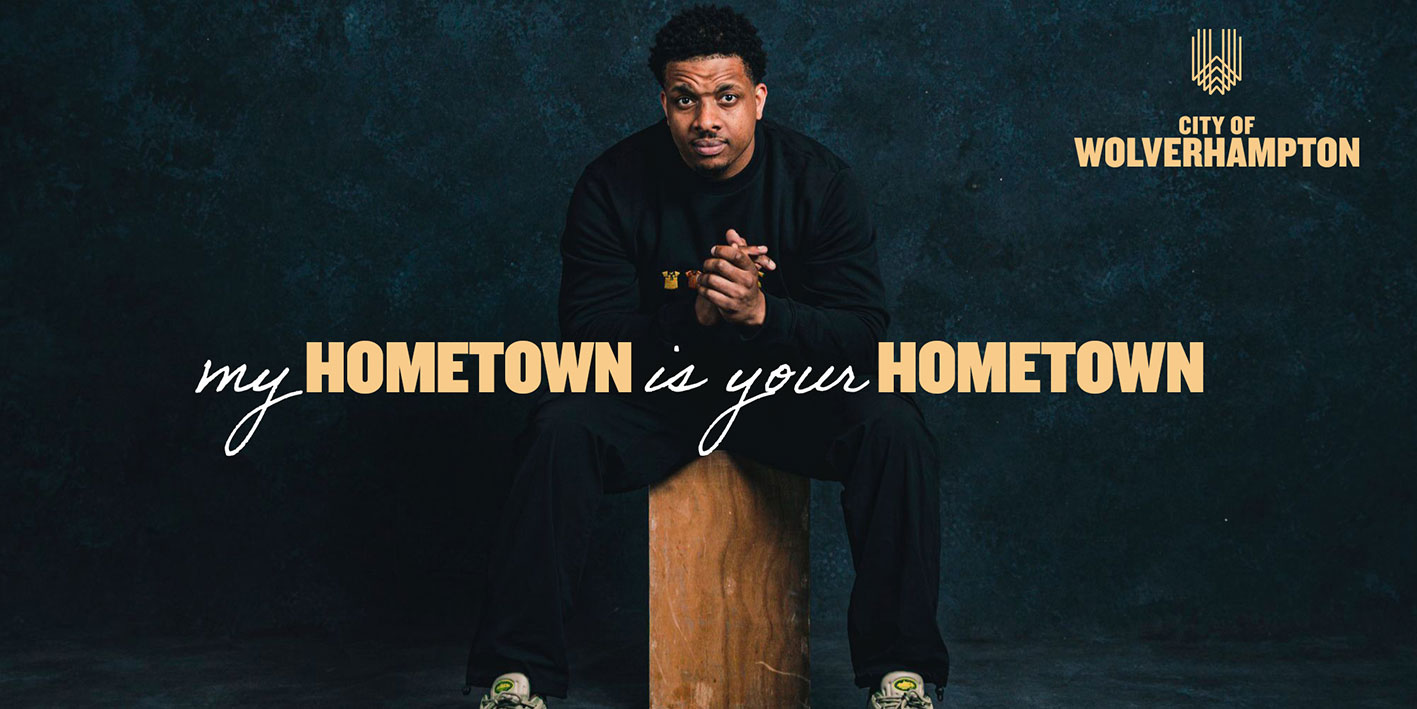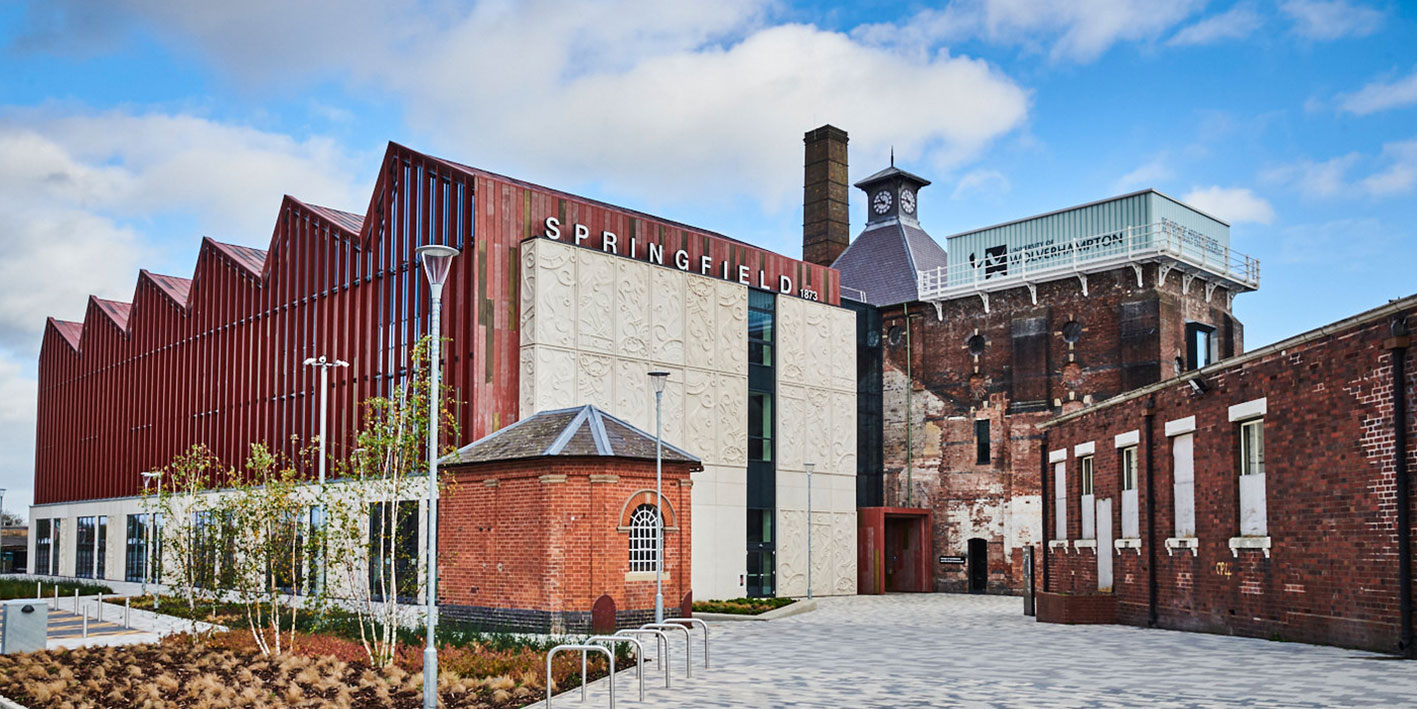
New report shows that engaging young people in heritage is key to Levelling Up

A new report released by the University of Wolverhampton shows that young people’s participation with heritage can build strong cohesive communities, promote social inclusion, and cultivate a sense of civic pride and belonging.
The Young People’s Engagements with Heritage: Tackling Inequality & Other Opportunities for Public Policy report has also shown that engagement with heritage can support the goals of government policy in terms of its ‘Levelling Up’ agenda.
The report was commissioned in 2021 by Historic England with the University’s Faculty of Arts, Business and Social Sciences’ Arts Connect and Institute for Community Research and Development (ICRD) teams.
The report calls for increased partnership-working between heritage organisations and the education, housing, transport, and healthcare sectors in order to harness the benefits that heritage can bring as well as increased intergenerational and cross-cultural heritage projects, developed, shaped, and led by young people, in the areas that they live.
This is the first report to provide evidence of the specific link between the outcomes of engagement with heritage and Levelling Up. Report findings show that getting involved in local heritage could reduce ‘brain-drain’ by encouraging young people to stay in so-called ‘left behind places’, claiming ownership over the spaces where they live, and contributing towards their revival. These findings add to well-documented research regarding positive personal and social outcomes of heritage engagement such as better mental health and wellbeing.
The report discusses seven case studies from around the country involving over 150 participants.
Projects featured include Stand Out, an LGBTQ+ heritage project in Burnley run by a team of young producers aged 13–25, the Adventurers History Club – which involved an all-male cohort of students from mainly British Asian and Somali heritage in East London who explored together the historical sites of London and beyond – and the Wild Sparks in Yorkshire which caters for 11-19-year-olds (up to the age of 25 for those with special educational needs), through a monthly club which offers outdoor activities and heritage crafts.
Dr Joshua Blamire, Research Associate in the ICRD, said: “Our research highlights the power of heritage in building cohesive communities, tackling social polarisation, and addressing inequalities. Yet this work is too valuable to be left to the heritage sector alone; instead, local, regional, and national partners – encompassing a broad range of sectors – need to play their part in harnessing the benefits that heritage has to offer. At the same time, there are an abundance of opportunities and possibilities within so-called ‘left behind’ places that are both culturally and historically rich and diverse.”
Rob Elkington, Director at Arts Connect, said: “We want this report to bring the voices and dynamism of young people to the fore in showing how their active participation with heritage in all its forms, enabled by heritage, museum and youth organisations matters way beyond their personal growth. We are also offering funders, heritage and youth organisations new language, evidence, and ideas to develop their ambitions for the contribution they can make to the revitalisation of places.”
Sandra Stancliffe, Head of Communities, Learning, Inclusion and Volunteering at Historic England, said: “We warmly welcome this report and the contribution it makes to filling the gaps in our knowledge. We hope the wider sector will use the findings to better describe and expand the unique role that heritage can play in transforming the lives of young people.”
Kenzie, Young Heritage Participant, said: “One of the reasons that heritage is so valuable to us as a collective, is that we all have it, and it’s one of the few threads that connects us all. By highlighting the impacts of heritage, this report shows the importance of it and the positive effects heritage can have on people; helping to bring people together to contribute to something bigger and better than what any individual can do when working alone.”
A free webinar to discuss the key findings of the report will be taking place on Wednesday 14 June, details can be found here.
Anyone interested in courses being offered in the Faculty of Arts, Business and Social Sciences should check out the website or register for one of our forthcoming Open Days.
Picture caption: Taken at an event organised by ICRD and Arts Connect last year, the event was called: Young People’s Heritage Showcase; and the projects the young people were/are involved in include Wild Sparks -Eden; Jason is a post grad student at Hull’s Wilberforce Centre and Hadia is from Connecting with Yemeni Elders Heritage.
ENDS
Radio, TV and press interviews can be arranged with the authors, Historic England and some of the young people involved. For all press enquiries contact Felicity Martin, Communications and Marketing Manager, Arts Connect. Mobile: 07779 773197. Email: F.Martin@wlv.ac.uk
Editors Notes
Arts Connect
Arts Connect has a mission to lead changes in provision and access to high-quality creative opportunities for children and young people, especially those who are disadvantaged and facing the highest barriers to engagement.
Arts Connect believe that engagement with the arts and culture in all its forms, the opportunity to take part, to create and produce culture supports young people to build the social and cultural capital that enables them to thrive. It builds creative skills that are valued by employers and can provide pathways into careers in the creative industries.
Arts Connect know that opportunities for young people are not equal and they aim to reduce these barriers through their work.
Institute for Community Research and Development
The ICRD Institute for Community Research and Development works with and in local communities to deliver effective community-based transformational projects, drive policy developments and promote social mobility. The ICRD uses interdisciplinary expertise to affect positive changes by working collaboratively with local communities and partnership networks.
Both Arts Connect and ICRD are part of the Faculty of Arts, Business and Social Sciences at the University of Wolverhampton.
About Historic England
We are Historic England: the public body that helps people care for, enjoy and celebrate England’s spectacular historic environment, from beaches and battlefields to parks and pie shops. We protect, champion and save the places that define who we are and where we’ve come from as a nation. We care passionately about the stories they tell, the ideas they represent and the people who live, work and play among them. Working with communities and specialists we share our passion, knowledge and skills to inspire interest, care and conservation, so everyone can keep enjoying and looking after the history that surrounds us all.
The 7 projects included:
(1) The Adventurers History Club (AHC) the brainchild of three Year Ten students from George Mitchell School in Leyton, East London. The AHC involved an academically mixed-ability all-male cohort of students from mainly British Asian and Somali backgrounds that began meeting in 2009. Of sixteen members, fourteen were from families where neither parent had attended university. The students helped plan and cost a programme of activities for this monthly history club and secured funding from the Gareth Butler History Trust and the Bishopsgate Foundation. Their stated mission was to “broaden the horizons and raise the aspirations of Londoners aged 16-25 from diverse communities by facilitating and funding their spare‐time participation in cultural and heritage activities” including, over a three-year period, visits to Tower Bridge, the Bank of England Museum, the Imperial War Museum, Windsor Castle and the Hajj Exhibition at the British Museum as well as fieldtrips to Cambridgeshire, Kent, and Bath.
(2) Nacro is a social justice charity in England and Wales predominantly focused upon assisting disadvantaged young people and vulnerable adults through housing, education and justice services. Nacro is England’s largest independent training provider of education and skills to 16–18-year-olds. We visited Nacro in Boston, Lincolnshire where adult learning courses include Animal Care, Gym Instructing and Childcare alongside compulsory GCSE Maths and English. In addition, students take part in Enrichment activities for which a cultural heritage component was recently introduced. The heritage activities covered within Enrichment include celebrating local history, visits to national heritage sites and classroom-based learning. The themes covered are social and geographical mobility, social inclusion, overcoming difference, tolerance and respect, identity and belonging and place-making.
(3) Hope Streets was a five-year project beginning in 2018 funded through the National Lottery Heritage Fund grants programme Kick the Dust. Led by the cultural education charity Curious Minds, Hope Streets was a strategic partnership that sought to deliver and embed long-lasting transformational change across the youth and heritage sectors through testing and refining new models of youth engagement and leadership which place the heritage sector at the heart of young people’s services. Hope Streets was predominantly museum-led and worked in partnership with The Atkinson, Cheshire West and Chester Museum Service, Lancashire Museum Service, Bolton Museum and Tullie House Museum and Art Gallery. It engaged 11-25-year-olds from diverse backgrounds in the North West and worked in collaboration with artists, other experts and heritage professionals. Young people were empowered to take up paid roles, to act as advisors and to contribute to heritage organisations’ strategic plans as a means of ensuring permanent change within heritage spaces.
(4) Ignite Yorkshire was also funded through Kick the Dust, a four-year project that worked with the youth and heritage sectors to engage diverse communities of young people aged 14-19 (and up to age 25 for SEND), out of school, with the industrial heritage of Yorkshire. Kick the Dust programmes emphasise partnership approaches and social enterprise. We are IVE was the lead organisation working with the Canal & River Trust, Canal Connections CIC, the National Coal Mining Museum for England, North Yorkshire Youth, Sheffield Industrial Museums Trust and Swinton Lock Activity Centre. Over 3,000 young people were involved across a range of diverse creative projects including a textiles heritage-based drama, a mining heritage festival, creative writing, blacksmithing and woodworking.
(5) Stand Out is an LGBTQ+ based heritage project run by a team of young producers aged 13–25, which works with the youth-led arts organisation Blaze Arts. Inspired by the first public meeting held by the Campaign for Homosexual Equality in 1971 at Burnley Library, Stand Out was formed in 2022 to explore local history and queer heritage in Burnley, particularly by gathering oral histories. The group’s aims are to revisit and reclaim the struggles of LGBTQ+ people and to combat discrimination within the town. Stand Out produced a Zine documenting local and general queer-related history and are set to host their own local Pride event.
(6) Formed through Ignite Yorkshire, a young people’s group – Bright Sparks – was first founded at North Yorkshire Youth, a youth charity based at Carlton Lodge Activity Centre, Thirsk. Over a three-year period, members of Bright Sparks worked together on heritage crafts projects supported by a permanent youth facilitator and drop-in artists and heritage crafts experts. Following the culmination of Bright Sparks, a new group was established – Wild Sparks – which catered for 11-19-year-olds (up to the age of 25 for those with SEND) through a monthly club which offered outdoor activities and heritage crafts. The majority of participants were White British; many had special educational needs and disabilities which had prompted a shift to their being home schooled. The themes for Wild Sparks are supporting personal development and resilience, helping people to acquire transferrable skills and enabling young people to have opportunities to reach places that would normally be inaccessible.
(7) Connecting with Yemeni Elders’ Heritage was an intergenerational project delivered by National Museums Liverpool working with a range of partners: the Liverpool Arabic Centre, the Al-Taiseer Mosque, the Al-Ghazali Centre, the Liverpool Arabic Arts Festival, and the Kuumba Imani Millennium Centre. The project was inspired by a 14-year-old boy of Yemeni heritage whose grandmother lives with dementia. Having discovered that the museum’s app “My House of Memories” – designed for people living with dementia – failed to portray pictures and stories of relevance to Liverpool’s Yemeni community, a project was born to help young people of Yemeni heritage support their parents and grandparents to connect with their cultural heritage. The material co-curated formed the content of the “Memories of Yemen” app launched in June 2022. The project’s themes included: bringing heritage institutions closer to their local diverse communities, strengthening partnership working between local communities and place-based heritage organisations and cultivating intergenerational community dialogue.
For more information please contact the Corporate Communications Team.


/prod01/wlvacuk/media/departments/digital-content-and-communications/images-2024/240624-Alumni-Awards-2024-Resized.jpg)
/prod01/wlvacuk/media/departments/digital-content-and-communications/images-18-19/220325-Engineers_teach_thumbail.jpg)
/prod01/wlvacuk/media/departments/digital-content-and-communications/images-2024/240627-UN-Speaker-Resized.jpg)
/prod01/wlvacuk/media/departments/digital-content-and-communications/images-2024/240320-Uzbekistan-Resized.jpg)
/prod01/wlvacuk/media/departments/digital-content-and-communications/images-2024/240229-The-Link-Resized.jpg)
/prod01/wlvacuk/media/departments/digital-content-and-communications/images-18-19/240726-Paramedics-Simulation-Resized.jpg)

